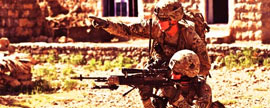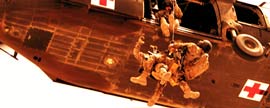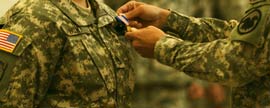Short answer: Yes
If you willfully failed to complete the corrective training assigned by your squad leader, and if your squad leader is an NCO–CPL or above, he/she could recommend to the commander that you receive UCMJ action for violating Article 91, “Insubordinate conduct toward warrant officer, noncommissioned officer, or petty officer.” One of the specifications (offenses) under this article is: “Willfully disobeying the lawful order of a warrant officer, noncommissioned officer, or petty officer.”
The other side of this issue is; “Why were you given corrective training in the first place?” If the reason for your corrective training was a violation of an article of the UCMJ, then you could also be charged with that offense during an Article 15 proceeding.
Disclaimer: I am not an attorney and any views presented are my own and are not to be
interpreted as legal advice. Furthermore, my views do not necessarily
represent the views of DoD or its Components.














Comments
SSG S
i have a soldier that i wrote a counseling for for “Failure to utilize their chain of command and nco support channel. in the plan of action i had her write an essay explaining the important of the chain of command and nco support channel along with the importance of accountability. She failed to provide me with the essay. What are my options as far as UCMJ or article 15???
SGT NICK
This is an excerpt from a NCOPD class we were given pertaining to this problem:
Typically Soldiers fail to use the chain of command for the following reasons:
• Lack of understanding
• Lack of trust in the chain of command or first line leader
• Concern over personal information being made public (affairs, personal issues, martial matters, etc)
It is best to educate the Soldier as to the requirement and reason for using the chain of command and where necessary develop trust with the Soldier so that they are comfortable in approaching the chain of command.
Extract of AR 600-20 para 2-1c
c. Proper use of the chain of command is vital to the overall effectiveness of the Army. Commanders must acquaint all their Soldiers with its existence and proper function. Effective communication between senior and subordinate Soldiers within the chain of command is crucial to the proper functioning of all units. Therefore, Soldiers will use the chain of command when communicating issues and problems to their leaders and commanders
Your Plan of Action should have looked like this if it was the first offence:
• Soldier was informed that in the future they should communicate any issues to me and that if they feel they cannot speak to me directly they are to inform me and I will set up a time and date for them to see someone else in the chain of command
• Soldier was provided a copy of AR 600-20 and was allowed to read the appropriate paragraph pertaining to use of the chain of command
• Soldier provided the following explanation for not utilizing the chain of command
Your Leader Responsibilities like this:
• Closely communicate with the Soldier and work to instill trust in the chain of command with the soldier
• Ensure soldier fully understands the violation and that future violations will not be tolerated
• Follow up with the soldier as needed
Now let’s get back to your question, let me make something perfectly clear to you SSG, she was most likely consulted on this matter from a higher or multiple NCO’s. Do not discuss future problems with her with other NCO’s anymore. She didn’t write that essay because the commander usually has an open door policy memorandum posted at the company HQ’s office; I’m speculating here but someone probably told her this. Make sure you know your regulations and policies before you administer another Event-Oriented counseling.
Some 1SG and Commanders entertain soldiers that abuse the open door policy, soldiers that complain about corrective training and not getting their way. I would provide a blank copy of the plan of action and leader responsibilities stated above to the 1SG for review to see if they will support it or not. At the next close out formation ask the 1SG and Commander to clarify what the open door policy is suppose to remedy for soldiers. They should also make it clear to them that it is not a place to try to get your NCO’s in trouble over frivolous complaints.
If you are having trouble training and mentoring female soldiers I recommend reading Colonel Jo B. Rusin’s book, Women on Your Team: A Man’s Guide to Leading Women. Hope this helps!